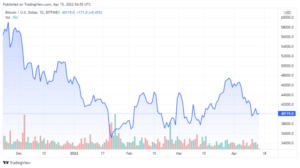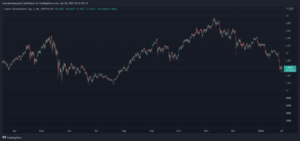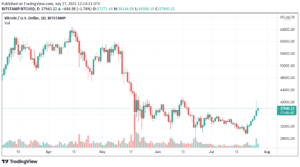
The Squid Game cryptocurrency, named after the beloved Netflix series of the same name, was the talk of the crypto space for the one week it was in operation. It quickly gained popularity among short-term holders interested in quick gains. The popularity of meme coins like Shiba Inu and Dogecoin with no utility but massive returns helped the token gain a following as investors are always on the lookout for the next 10,000x gains.
Squid played right into the greed of investors who were looking to make big gains in the market in a short amount of time. However, an interesting thing about the crypto was its clear warning from the start from the developer. Somehow, investors had missed (more like ignored) all of the warning signs that came with the shitcoin. What was a clear scam from the beginning still managed to make off with at least $3 million of investors’ funds. How?
Related Reading | Ethereum DeFi Protocol Cream Finance Succumbs To $130 Million Flash Loan Hack
Inability To Sell
The Squid Game team described this sell restriction as an anti-dumping mechanism. In reality, it prevented holders from being able to get rid of the SQUID tokens that they held. It is quite simple; if people can’t sell, then they can’t dump the coins. Leaving the developers in a position where they are the only ones who can exist from the project. Somehow, investors completely ignored this glaring red caution sign that said scam.
There was a twist to selling though. Seeing as preventing holders from being able to sell might be too obvious, developers of the project put a contingency in a place where holders can sell their coins. To sell SQUID tokens, users would also have to hold another token called Marbles. Selling five Marbles would allow a holder to sell one SQUID. However, the Marbles were more expensive than the SQUID tokens, which means that holders could not sell without taking a loss.
Related Reading | Trillion Dollar Mistake: Is China Planning To Reverse Crypto Ban?
As time went on, the number of Marbles required to sell one SQUID increased, reaching 20 Marbles for a single SQUID by the time the project came crashing down. This made it so holders could not exist the project if they wanted without losing a significant portion of their investments.
The Squid Game Whitepaper
Do your own research (DYOR) is a popular saying in the crypto space and it is not said lightly. Before investing in a project, investors are advised to make sure that they have properly researched it. These include things like looking at the website, the roadmap, and more importantly, the Whitepaper. In this case, the Squid Game Whitepaper was a dead giveaway that it was a scam.
Firstly, the Whitepaper was riddled with spelling and grammatical errors which were pointed out in various publications. A further deep dive into the Whitepaper unveiled even more clear intent on the part of the developers to exit-scam its investors. Just like the beloved Squid Game series, there can only be one winner, and that is the developers.
Related Reading | Elon Musk’s Alma Mater Launches Bitcoin Payment For Business Course
The developers said in the Whitepaper that they intended to scam investors with the project and yet no one listened. In the space of a week, the value of the coin grew from a meager 1 cent per SQUID to $2,800 per SQUID at its peak before the crash. The rug pull that followed saw the developers make off with at least $3 million, with others claiming that they might have gotten away with as much as $10 million.
Investing With Greed
One of the main factors behind falling for scams is greed. Investors who want fast returns on their investments are more likely to fall for scams like Squid Game. As indicated by the Fear & Greed Index, the market had hit a one-year record on the scale when the market went into extreme greed last week. This had propelled investors to put more money into shitcoins in hopes to get massive returns quickly.
SQUID seemed to have provided this as the token had grown over 1,000% in the first few days after release. For a second, the total market cap of SQUID hit over $2 trillion, rivaling the total market cap of the crypto market. However, users were stuck unable to sell off their holdings. Investors lost millions of dollars to the project, with one user claiming that they had put their life savings in the token.
Related Reading | How A Coinbase User Lost $11.6 Million 10 Minutes After Bitcoin Purchase
The rug pull has left in its wake sadness, anguish, anger, but above all, lessons. Hopefully, this is a wake-up call for investors when investing in projects that over-promise. As the saying goes, “if it is too good to be true, then it probably is.”
At the time of writing, the Squid Game website is gone, along with its social media accounts. The Whitepaper is no longer accessible and the token has crashed down to $0.
Featured image from The Guardian Nigeria, chart from TradingView.com
- &
- All
- among
- Ban
- Bitcoin
- business
- call
- China
- Coin
- coinbase
- Coins
- Crash
- crypto
- Crypto Market
- cryptocurrency
- dead
- DeFi
- Developer
- developers
- Dogecoin
- Dollar
- dollars
- FAST
- finance
- First
- Flash
- For Investors
- funds
- game
- giveaway
- good
- guardian
- here
- hold
- How
- HTTPS
- image
- index
- intent
- investing
- Investments
- Investors
- IT
- launches
- Market
- Market Cap
- Media
- meme
- million
- money
- Netflix
- Nigeria
- payment
- People
- planning
- Popular
- preventing
- project
- projects
- protocol
- Reading
- Reality
- research
- returns
- reverse
- Scale
- Scam
- scams
- sell
- Series
- Shitcoin
- Short
- Signs
- Simple
- So
- Social
- social media
- Space
- start
- time
- token
- Tokens
- twist
- users
- utility
- value
- Website
- week
- Whitepaper
- WHO
- writing










